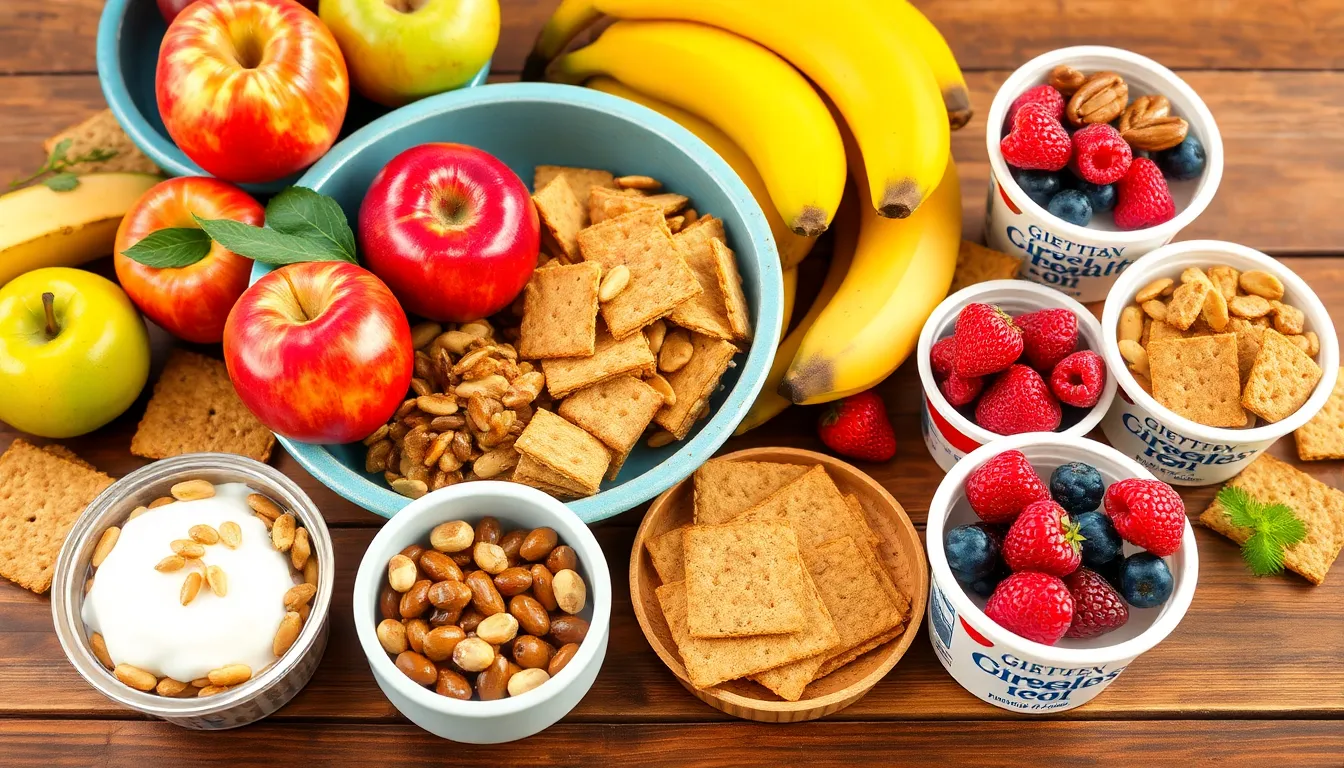In a world where snack time often means reaching for a bag of chips or a sugary treat, the quest for healthy snacks can feel like searching for a unicorn. But fear not! Healthy snacking doesn’t have to be boring or tasteless. With a little creativity, it can be a delightful adventure that satisfies cravings without the guilt.
Table of Contents
ToggleWhat Are Healthy Snacks?
Healthy snacks provide nutritious options that satisfy hunger while supporting overall wellness. Understanding their definition and importance helps individuals make better food choices.
Definition and Importance
Healthy snacks consist of nutrient-dense foods that offer vitamins, minerals, protein, and healthy fats. Examples include fruits, vegetables, nuts, yogurt, and whole grains. Their role in a balanced diet is crucial, as they can stabilize blood sugar levels and prevent overeating during meals. Incorporating healthy snacks can enhance energy levels and improve focus throughout the day. Many individuals find that choosing these options contributes to long-term health benefits, such as weight management and reduced risk of chronic diseases.
Common Misconceptions
Many people believe healthy snacks lack flavor and variety. This perception leads to craving traditional junk food. Another misconception revolves around convenience; individuals often think preparing healthy snacks requires excessive time and effort. On the contrary, simple options like carrot sticks or fruit slices take minimal preparation. Some individuals avoid snacking altogether, thinking it promotes weight gain. In reality, consuming nutritious snacks aids in managing appetite and maintaining energy. By debunking these myths, further engagement with healthy snacking becomes attainable.
Types of Healthy Snacks

Healthy snacks come in various forms, providing tasty and nutritious options. Each category offers unique benefits to support overall well-being.
Fruits and Vegetables
Fruits and vegetables rank among the healthiest snack options available. They are rich in vitamins, minerals, and antioxidants, essential for optimal health. Apples, bananas, carrots, and bell peppers are all portable and easy, making them convenient choices for on-the-go snacking. Incorporating a variety of colors enhances nutrient diversity and makes snacks visually appealing. Pairing apple slices with almond butter or baby carrots with hummus adds protein and healthy fats, promoting satiety.
Nuts and Seeds
Nuts and seeds deliver a hefty dose of healthy fats, protein, and fiber. Almonds, walnuts, chia seeds, and sunflower seeds provide sustained energy and can curb hunger effectively. A small handful serves as a satisfying snack, ideal for mid-afternoon cravings. Nutritional benefits include essential fatty acids and vitamins that contribute to heart health. Mixing nuts and seeds creates a trail mix that’s easy to prepare and store, offering flavor and texture variety.
Whole Grains
Whole grains offer a nutritious foundation for healthy snacking. Foods like oats, quinoa, and whole grain crackers provide complex carbohydrates and fiber, which stabilize energy levels. Snacking on air-popped popcorn, seasoned with herbs or nutritional yeast, satisfies cravings in a low-calorie format. Pairing whole grain options with protein-rich toppings, such as peanut butter or cheese, enhances their health benefits. These snacks support digestion and help maintain stable blood sugar levels.
Dairy Options
Dairy options play an essential role in a healthy snacking routine. Greek yogurt, cottage cheese, and kefir supply protein and calcium, vital for bone health. Adding fresh fruits or honey to yogurt creates a delicious and nutritious snack that complements taste with health. Cheese sticks or slices paired with whole grain crackers make for a crunchy and satisfying snack. Opting for low-fat or lactose-free varieties accommodates those with dietary restrictions while still delivering essential nutrients.
Benefits of Healthy Snacks
Healthy snacks provide various advantages that support overall well-being. These nutrient-dense options contribute positively to a balanced diet.
Nutritional Advantages
Healthy snacks offer significant nutritional benefits. Fruits and vegetables, rich in vitamins and minerals, promote good health. They also contain antioxidants that combat oxidative stress. Nuts and seeds deliver healthy fats, protein, and fiber, essential for bodily functions. Whole grains enhance satiety and provide lasting energy due to their complex carbohydrates. Dairy products like Greek yogurt supply calcium and additional protein, making them an excellent choice for a snack. Incorporating these nutrient-rich foods leads to improved health outcomes and ensures adequate intake of essential nutrients.
Impact on Energy Levels
Energy levels see notable improvement with healthy snacks. Nutrient-dense foods help maintain stable blood sugar levels, preventing sudden crashes. Fruits provide natural sugars along with vitamins, offering a quick energy boost. Whole grains digest slowly, providing sustained energy throughout the day. Additionally, protein-rich snacks like yogurt or nuts support sustained energy release. These options not only satisfy cravings but also enhance focus and productivity, making them ideal for mid-morning or afternoon dips.
Role in Weight Management
Healthy snacks play a crucial role in effective weight management. Consuming snacks between meals prevents excessive hunger and reduces the likelihood of overeating at main meals. Nutrient-dense snacks promote fullness, helping individuals resist unhealthy choices. Foods high in fiber and protein, such as vegetables and nuts, keep appetite in check. Choices like air-popped popcorn can satisfy cravings without excessive calories. Incorporating these snacks strategically within a balanced diet supports weight loss or maintenance effectively.
Homemade vs. Store-Bought Snacks
Both homemade and store-bought snacks offer unique advantages and disadvantages. Understanding these can help in making informed choices.
Pros and Cons of Homemade Snacks
Homemade snacks often feature fresh ingredients. They provide complete control over flavors, portion sizes, and nutrient content. Nutrient density can be maximized by using wholesome ingredients like whole grains, fruits, and nuts. Convenience may pose a challenge, as preparation takes time and effort. Storage can also be an issue; some snacks may not keep well without preservatives. On the upside, homemade snacks can be customized to accommodate specific dietary needs, making them versatile and healthy.
Evaluating Store-Bought Options
Store-bought snacks present a quick solution for busy lifestyles. Many brands offer healthy choices that include whole grains, nuts, and reduced sugar options. Nutrition labels can provide valuable information on ingredient quality and caloric content. However, processing can introduce unhealthy additives, such as excessive sugars or unhealthy fats. It’s crucial to evaluate ingredient lists and nutrition facts to avoid hidden calories. Despite potential drawbacks, many store-bought snacks cater to health-conscious consumers, offering convenience without sacrificing nutrition.
Tips for Choosing Healthy Snacks
Selecting healthy snacks can enhance overall well-being. Making informed choices contributes to better health outcomes and energy levels.
Reading Labels
Nutrition labels offer crucial insights into food contents. Identifying serving sizes on labels helps manage intake effectively. Noticing calories, sugars, and unhealthy fats ensures healthier options are chosen. Fiber and protein contents significantly impact satiety and overall nutrition. Looking for snacks with minimal added sugars and preservatives reinforces good health practices.
Portion Control
Maintaining appropriate portion sizes is key to healthy snacking. Using small containers or bags can help limit quantities and prevent overeating. Assessing hunger levels prior to snacking encourages mindful eating habits. Individuals should aim for balanced portions, distributing healthy snacks throughout the day for consistent energy. Managing portions reduces mindless munching during various activities, promoting more intentional eating experiences.
Combining Snacks for Balanced Nutrition
Combining snacks enhances their nutritional profile. Pairing fruits with nuts provides a mix of vitamins, healthy fats, and proteins. Yogurt and whole grain crackers create a satisfying combination, delivering calcium and fiber. Vegetables paired with hummus offer crunch and flavor while including essential nutrients. Encouraging diversity in snack combinations boosts nutrient intake and keeps snacking enjoyable.
Healthy snacking doesn’t have to be a chore. With a little creativity and the right choices, it can be both satisfying and enjoyable. Embracing nutrient-dense foods like fruits, vegetables, nuts, and whole grains not only supports overall wellness but also keeps energy levels stable throughout the day.
By being mindful of portion sizes and combining snacks for balanced nutrition, individuals can find a variety of flavors and textures that cater to their cravings. Whether opting for homemade delights or convenient store-bought options, the key is to prioritize nutrition without sacrificing taste. Making healthy snacks a regular part of one’s diet can lead to lasting benefits for body and mind.









